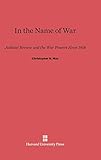In the Name of War : Judicial Review and the War Powers since 1918 / Christopher N. May.
Material type: TextPublisher: Cambridge, MA : Harvard University Press, [2013]Copyright date: ©1989Edition: Reprint 2014Description: 1 online resource (370 p.)Content type:
TextPublisher: Cambridge, MA : Harvard University Press, [2013]Copyright date: ©1989Edition: Reprint 2014Description: 1 online resource (370 p.)Content type: - 9780674180673
- 9780674180680
- Geschichte (1913-1921)
- Geschichte (1914-1921)
- Geschichte 1918-1921
- Judicial review
- Kriegsrecht (Staatsrecht)
- Legislation
- Normenkontrolle
- Political science
- Recht
- War and emergency powers
- Judicial review -- United States -- History
- United States -- Politics and government -- 1913-1921
- War and emergency powers -- United States -- History
- World War, 1914-1918 -- Law and legislation
- LAW / General
- 342.73/052
- KF4575
- online - DeGruyter
| Item type | Current library | Call number | URL | Status | Notes | Barcode | |
|---|---|---|---|---|---|---|---|
 eBook
eBook
|
Biblioteca "Angelicum" Pont. Univ. S.Tommaso d'Aquino Nuvola online | online - DeGruyter (Browse shelf(Opens below)) | Online access | Not for loan (Accesso limitato) | Accesso per gli utenti autorizzati / Access for authorized users | (dgr)9780674180680 |
Frontmatter -- Preface -- Contents -- 1. The War Powers at the Armistice: Where the Will Meets the Way -- 2. Experiments in Socialism: Federal Control of the Rails and the Wires -- 3. Wartime Prohibition: “A Freakish Legislative Child” -- 4. The High Cost of Living: Recipe for Revolution -- 5. The War on Radicalism: Prosecuting the American Heretic -- 6. Censorship and the “Cowed Mind”: Perpetuating the Aura of Repression -- 7. Judicial Review: Its Hour Come Round at Last -- 8. The Tug-of-War over Rent Control: A Futile Exercise in Defiance -- 9. Preserving the Legacy: The Timing of Judicial Intervention -- Abbreviations. Notes. Index -- Abbreviations -- Notes -- Index
restricted access online access with authorization star
http://purl.org/coar/access_right/c_16ec
For more than a century, in settings where the political branches of government were unable or unwilling to exercise self-restraint, the Supreme Court was disposed to treat federal war powers legislation as exempt from judicial review, an attitude that permitted numerous abuses from Prohibition to press censorship. Though the First World War officially ended in 1918, the Senate's rejection of the Versailles Treaty kept the United States in a legal state of war until late 1921. Exploring the interplay between political and social events and the evolution of legal theory Christopher May tells how during this challenging three-year period, the government invoked the war powers to pursue ends otherwise beyond its reach: with the backing of Congress and seemingly free from judicial scrutiny, the Wilson administration took over the country's rail and communications systems, outlawed profiteering, prosecuted strikers, suppressed "radicals' and censored the leftist press. None of these measures bore any true relation to the war, says the author, who then describes the course through which the Supreme Court, confronted by this pattern of abuse, finally abandoned its long-standing refusal to review the constitutionality of war powers legislation. In the Name of War explores the roles played by Woodrow Wilson, Joseph Tumulty, Albert Burleson, and A. Mitchell Palmer--men whose personal ambitions frequently shaped official policy in the late Progressive Era. After analyzing the Court's more recent record, including the internment of Japanese-Americans in World War II, May draws some practical conclusions about the use of judicial intervention in time of crisis that are sure to attract the attention of lawyers, legal scholars, historians, and students of the Constitution.
Mode of access: Internet via World Wide Web.
In English.
Description based on online resource; title from PDF title page (publisher's Web site, viewed 29. Nov 2021)


